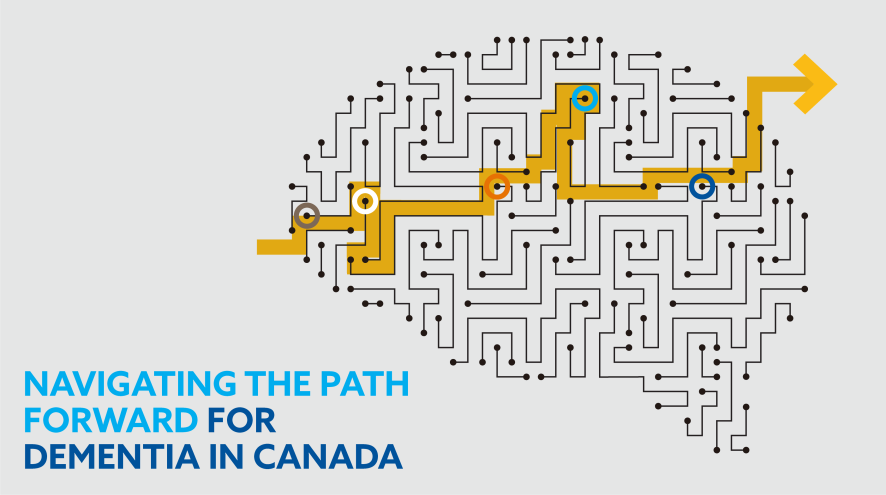New report: The Landmark Study Part 1
A new study released today by the Alzheimer Society of Canada forecasts a tripling of the number of people living with dementia across the country by 2050. However, modelling shows that there may be ways to reduce the impact of the disease.

A new report, called “Navigating the path forward for dementia in Canada,” is the first volume of The Landmark Study, which has been prepared by the Alzheimer Society of Canada. The study, being released as three reports, represents the most significant update of the dementia prevalence in Canada and its forecasted growth since the Society’s “Rising tide” report, which was issued in 2010. The two subsequent volumes, which will shed light on the economic and social impact of dementia in Canada over the next three decades, will be released later this year.
An aging generation
“As Canada’s baby boomer generation continues to age, the number of people in Canada living with dementia will rise significantly over the next 30 years,” says the study’s author, Dr. Joshua Armstrong of the Alzheimer Society of Canada. “The impact of this change, both on the number of people living with dementia and their care partners, can be lessened if governments and individual Canadians are prepared to take action to reduce the modifiable risk factors associated with the onset of dementia.”
Highlights for Canada
In 2020, an estimated 597,300 people were living with dementia in Canada. By 2030, we can expect this number to reach almost one million. By 2050, this number is expected to triple to 1.7 million.
Across Canada in 2020, care partners – including family or friends – spent approximately 26 hours per week supporting daily activities and tending to the daily care needs of people living with dementia. This figure is equivalent to 235,000 full-time jobs and valued at more than $7.3 billion annually.
Predictions for B.C.
Here in B.C., an estimated 50,400 family, friends and neighbours provided support to people living with dementia in 2020. This is projected to increase to 144,900 by 2050. The overwhelming majority of care partners are adult children and spouses, 88 per cent of whom are of working age. Women continue to disproportionately bear caregiving responsibilities.
Juggling caregiving responsibilities with career and other family demands may force care partners to exit the workforce prematurely, which will have a significant socioeconomic impact on Canada’s work force and people’s financial stability.
Highlights for B.C.
- If current trends continue, the number of hours of support provided by caregiving partners within Canada could reach almost 1.4 billion hours annually by 2050. That is equal to over 690,000 full-time jobs. In British Columbia, this figure will reach 198.3 million hours annually by 2050.
- The report highlights three hypothetical scenarios in which the onset of dementia for British Columbians is delayed by one, five or 10 years. While no specific assumptions were made as to how to achieve these reductions, the scenarios illustrate the power of risk reduction at both a population and individual level. If we were able to defer the onset of dementia by five years, we would see the number of individuals living with dementia in British Columbia in 2050 drop from an estimated 247,300 to 145,500.
- If we were able to defer the onset of dementia by 10 years, the estimated number of persons living with dementia in British Columbia would decrease to 76,400.
- We would also see an accompanying decrease in the total number of care partners and the annual number of hours of support provided.
Here in B.C., the report has found that 85,800 people are living with dementia across the province, but projects as many as 247,300 people will have a diagnosis by 2050. “B.C. is expected to see one of the most dramatic increases in the number of people living with the disease over the next 30 years,” says Jen Lyle, CEO of the Alzheimer Society of B.C. “We need to start taking action to ensure that supports are in place to mitigate the impact and ensure people affected by dementia are not facing it alone.”
Learn more
Click here to learn more about the report.
Click here to read the 2010 study, “Rising tide: The impact of dementia on Canadian society.”
To access help, contact the Alzheimer Society of B.C.’s First Link® Dementia Helpline at 1-800-936-6033. The Helpline is available Monday to Friday, 9 a.m. to 8 p.m. Information and support is also available in Punjabi (1-833-674-5003) and in Cantonese or Mandarin (1-833-674-5007), available Monday to Friday, 9 a.m. to 4 p.m.
